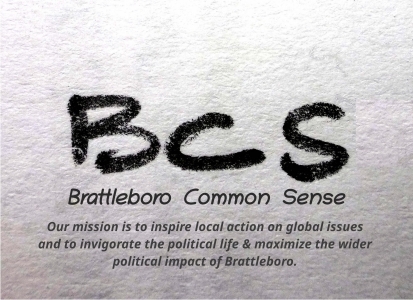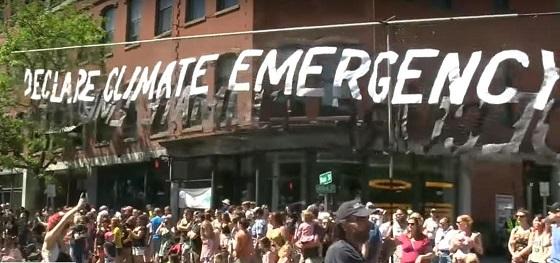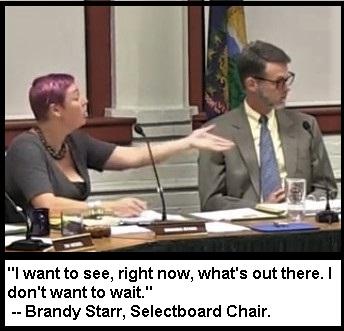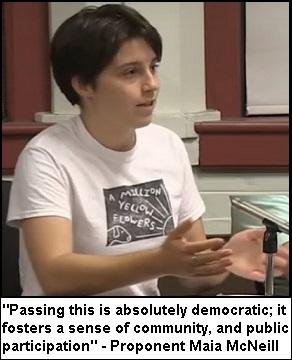
This is a test site for: Brattleboro Common Sense
Email inquiries to: info@brattleborocommonsense.org
BCS Projects and Updates
Group seeks feedback for SAFE policing
A local group proposing ways police can disarm is looking for feedback from the community on what “safe policing” means to them… Read article
BCS is researching the practice of regular police patrols without side-arms. BCS first proposed the idea to Chief Michael Fitzpatrick in 2017. BCS executive Kurt Daims reminds the public that the project is NOT an effort to correct the Brattleboro Police in any way. “It is a basic research project to advance the science of law enforcement… [read]He (Chief Fitzgerald) represents the best of Brattleboro’s innovative spirit and social conscience.”
In a meeting October 7 (2019) Daims and BCS economist Adam Marchesseault presented research relevant to weaponless patrols for the chief’s review, and on November 21 interviewed BPD Captain Carignan and the department’s “Use of Force” instructors to hear their thoughts and concerns. BCS is now arranging conversations between Brattleboro’s officers and officers in countries with reduced-weapon practices.
A strong majority of officers in the UK feel the trust of the public would be lost if they carried side-arms. In some places officers rely on backup from sharpshooters or have side-arms nearby in their cruisers. New Zealand is another country with much experience with such practices.
[/read]
Safe Policing Commentary
BCS AND THE LONG VIEW ON POLICE REFORM
Brattleboro Common Sense is proposing a very simple, cost-free solution for police reform. But it is not a sudden new idea. [read]
Last month Brattleboro Common Sense (BCS) petitioned for a public vote on the budget, in order to expand the debate on police defunding, but we were blocked by legal maneuvers of town government. It wasn’t the first time. Brattleboro Common Sense began fighting to defund the police in 2012, by leading the opposition to an over-the-top expensive police station (the Police-Fire Project). The proponents of the new building received unlimited time for the expression of their views at representative town meeting. After the people voted to reject the budget in 2014, one town official actually proposed that the same budget be returned to the people without changes. At a budget review meeting the selectboard actually gained a ruling to censor any discussion of the expensive project, which was included in that budget. Such resistance is systemic. Nonetheless, we persisted. Our own mistakes allowed the police to move from downtown to their isolated bunker-like headquarters on Black Mountain Road, but three petition drives and a budget controversy finally saved the town $2.7 million.
Besides the defunding efforts BCS began the Safe Policing project in 2017 upon hearing of the killing of Michael Bell. Mr. Bell had been shot and killed, allegedly because an officer panicked when he thought that Bell had grabbed his pistol, while the pistol was only snagged on the mirror of the patrol car. The gun is an obvious part of the problem, protruding from the officer’s hip into peoples’lives. We thought it should be the focus of a solution.
Brattleboro Common Sense will offer to the selectboard and the new review committee the most simple, obvious and costless solution to prevent hasty and accidental shootings by police: a research-based proposal for weaponless policing. (We will use the term “weaponless” to mean “without fire-arms”.) We propose a new practice, based on foreign models where police do not regularly carry side-arms. We believe this model will fundamentally improve relations between officers and the public. Removing the gun is more than just a solution to the numerous and tragically-stupid horrors like Mr. Bell’s death. To disarm police will be transformative in policing and in our whole society. It will make possible new equality and trust with the people and prevent killings by other means. You may ask, how would this have helped George Floyd ? Mr. Floyd wasn’t killed with a gun. He was killed by a racist officer’s sense of impunity. This is the arrogant mental force that makes any weapon lethal, the mindset of the gun. Removing the gun forces the officer to look beyond that mindset, beyond his ability to take life in the process of protecting it, and see a world full of more than just threats. That mindset is a danger to black men and is impeding police reform here in Brattleboro and elsewhere.
When BCS workers Shela Linton and Kurt Daims met with Brattleboro Police Department (BPD) Chief Fitzgerald in October 2017, Linton pressured the chief to explain the need for fire-arms, and he insisted, “Everyone is a threat”. At an informal question-and-answer session on the Commons, the chief was invited to remove his pistol, but refused to do so. When asked why, he said, “It is part of my profession.” Apparently, without a gun, you’re not a real cop. This will be news to 120,000 police officers in England, and tens of thousands more in New Zealand and other countries who do not normally carry guns on patrol. The fact is, guns are part of policy; they are not essential to the profession. And another fact is, according to BPD, there are not enough violent line-of-duty injuries for the department to keep track of. Brattleboro is not a dangerous place for police. Seeing threats around him, the chief embodies a bunker mindset. He is eager to listen but unable to hear. Having engaged with the chief pleasantly since 2017, we regret that the time has come to rely on a different process. A new police review board is in order.
The gun also affects the way civilians see policemen. Research shows that the visual stimulus of the weapon raises the heart rate of the viewer; the implied threat of lethal force creates a subconscious response. To analyze violent interactions like official shootings psychologists use a theory called the General Aggression Model. This theory posits that aggression happens from real or perceived threats on each side amplifying each other until the situation escalates to physical aggression. This starts with the “Weapons Effect”: the visual stimulus of the weapon. It triggers anxiety that can be perceived by an officer as aggression. Without the weapon, this subliminal stimulus to escalate is removed.
BCS has studied examples of police who do not routinely carry firearms. The most instructive are in the England and New Zealand. In the case of England, a country which has never equipped its officers with firearms for routine patrols, we see policing in a place that is developed, densely-populated, culturally similar to the US, and has considerable gun ownership rates. The result is a country with low rates of officers killed on duty and of officer-involved shootings, high public trust, and a system of policing that is supported by its officers. Meanwhile, New Zealand has changed from arming all officers, to arming no officers, to arming some and keeping weapons in the patrol car for emergencies. This last model may be the best from our perspective, respecting the safety of officers and civilians in a place that is somewhat similar to Vermont, with a rural population and high rates of gun ownership, education, and public trust. Of course, the United States is different from these countries. However, Brattleboro is also different from Chicago. Must we police with the same practices they employ in Chicago? Frankly, we have more in common with New Zealand.
We propose a test program that fits easily with procedures that BPD already has in place: weaponless policing will be practiced during each officer’s usual one-hour weekly downtown patrol. As part of the review of the trial patrols our officers will consult with officers who have done weaponless patrols. BCS worker Heather Urquhart in Scotland has arranged for officers there to talk with us here. These officers are experienced with weaponless policing and eager to help. We have even been contacted directly by a UK constable who heard about the Safe Policing project from a friend. The response has been so favorable that we are considering arranging conversations for police elsewhere in the US, besides ours in Brattleboro.
We all get angrier with each black man dead at the hands of unaccountable police and more cynical at politicians calling for a national conversation. Brattleboro’s conversations have people treating police as enemies. But let’s be real here: they’re NOT ALLIES either: they’re a separate team, and they need help to come out of their bunkers and see things in a new light. Brattleboro is safe for them, and BCS has worked out a simple scientific plan for saving lives, and conversations between our police and other police who want to help. This plan will be easy to start while the selectboard works out the new police review procedures.
[/read]
BCS Nonprofit Donor Drive
Brattleboro Common Sense has organized for a decade, and in 2018 we registered as a 501(c)3 nonprofit. We’re building a local donor base to stabilize our work, ensure community accountability, and attract outside funding.
Please give what you can to support organizing for cutting-edge local responses to global issues.
BASIC RADICAL CONSERVATION
Karl Hammer, founder and president of the Vermont Compost Company in East Montpelier, speaks about farming, donkeys, manure & more. Listen to the podcast here.

Declaration of Climate Emergency, Sustainability Coordinator and Common Sense Conservation
Our petition for Common Sense Conservation and the Sustainability Coordinator has done its part, and the position has been approved. Appropriate funding was initiated by BCS director Spoon Agave, and is also approved. The other terms of the petition were not approved. So, [read]we try to serve their purpose by promoting a fast-track for peoples’ proposals in clause 12 of the Declaration of Climate Emergency.
At the Selectboard meeting of September 17, 2019 the board criticized the declaration because of the measured references to war. We feel that such attitude is a denial of the devastation and death that are happening to people in southern Asia and Africa; it is certainly like a war to them. We will carry on the fight for climate justice in the strongest terms (even Greta Thunberg refers to the crisis as a war). While we regret the delay, we value the Selectboard’s input regarding provisions that are specific to Brattleboro and believe their comments have greatly improved the declaration.
[/read]
Renewable source electricity (RSE)
In 2010 Brattleboro’s Town Meeting Reps rejected the proposal for renewable-source municipal electricity, [read]known then as the Nuclear Divestment Resolution, by a slant of 2 to 1. BCS has persisted in asking public input and promoting the idea to town government, and the proposal has been subject to three more official votes, the last in September 2019. It involves very little funding, but with the September 27, 2019 vote, the town clears the way for instigating renewable source electric projects to complete its 100% renewable power portfolio.
[/read]
Pollution at High School Athletic and School Board Climate Inclusion
The BCS resolution to put climate crisis on the agenda of every school board meeting has resulted in the creation of a committee, the “Climate Crisis Task Force”. [read]The chairperson of the school board, Christina Naylor, believes that the committee is in compliance with the resolution. It has great strategic value, although it does not provide as much public participation or expedite the approval process the way the agenda item might do. BCS’ volunteer Django Grace is using his new position on the committee to advocate against the astroturf proposal for the high school athletic field. Django and local residents dealt this pollutant boondoggle a serious set-back December 5, when the committee considered putting the project to a public vote (which the astroturf supporters don’t want). The board was persuaded to postpone the project. Unfortunately the price of this maneuver is a $30,000 “engineering study”. BCS director Tim Maciel has written the school board to urge them to get estimates from companies familiar with alternate turfing methods.
[/read]
Selectboard Implements BCS’s “Cow-Power” Initiative
At their September 17, 2019 meeting, the Brattleboro Selectboard took the final step in instituting a proposal first brought by Brattleboro Common Sense and approved in 2018’s Representative Town Meeting. The Selectboard vote was unanimous. [read]
 The original proposal was to complete Brattleboro’s transition to fully renewable-sourced energy, and to do so using Cow Power, a program of Green Mountain Power. The proposal has evolved to use local, small electricity generating projects instead.
The original proposal was to complete Brattleboro’s transition to fully renewable-sourced energy, and to do so using Cow Power, a program of Green Mountain Power. The proposal has evolved to use local, small electricity generating projects instead.
Assistant Town Manager, Patrick Moreland, worked tirelessly to do all of the calculations and investigate resources, and presented a memo of recommendation to the Board.
The memo said that the Town can provide the amount calculated to cover the Cow Power program, ($16,333.12), “to further support an existing or imminent renewable energy project in Brattleboro, of which there are several.” It continues, “Interested parties will be asked to describe their project and to define its benefits both to its users and to the broader community of Brattleboro… staff will return to the Board in late October or early November with the results.”
Some Board members proposed tabling action until the new Sustainability Coordinator position is filled, or to file it over to the Energy Committee, or both. Board members Elizabeth McLoughlin and Brandy Starr spoke in favor of launching the process immediately, which was the final decision.
[/read]
Climate Emergency Declaration
Rejected By Brattleboro Selectboard
The Brattleboro Selectboard voted down BCS’s proposed Climate Emergency Declaration, by a vote of 3-2, at their September 17, 2019 meeting. [read]
Selectboard members Tim Wessel, Danel Quipp and Elizabeth McLaughlin voted against it, members David Schoales and Brandy Starr voted in favor.
BCS is keeping the project moving, by incorporating the Selectboard’s feedback and by reaching out to communities on the front lines of Brattleboro’s climate crisis.
 [/read]
[/read]
The Floodplains Empowerment Project will support residents who live in Brattleboro’s floodplains to get answers and accountability at every level of government, and to come together in solidarity and mutual aid. See floodplains map…
On March 5th (2019) Brattleboro approved the BCS town charter amendment for lowering to 16 the legal age for voting in town elections, and for serving as school directors and town representatives. The amendment passed in a landslide nine-to-four election, four years after losing by four to six. “I am happy to see that the people in Brattleboro are noticing 16 and 17 year olds as we are: taxpayers and fully-functioning members of society,” said Rio Daims, 17, the Youth Vote campaign coordinator. “We as youth are very invested in political decisions, and we’re finally getting the voice we have always deserved.” [read]
The amendment also requires the approval of the state legislature, which is virtually assured, but the provision on school board representation may require changes because of the merging of school boards under Act 46. BCS is in contact with the House Committee on Government Operations about possible ways to revise the amendment and send everything that needs no alteration through the ratification process speedily.
[/read]
With new tax revenue porposals and research expanding into “Capital Slip” and “capital flight”, the BCS Wall Street Tax project may move the needle on wealth inequality issues in the US. We may petition the Selectboard to submit it to Representative Town Meeting for debate and approval in the first half of 2020 [read]
Currently, we are honing the economic research in order to craft the most exact, viable and easily enforceable measure, and updating the numbers on previous detailed research that was done on the project. This will take some money, so please consider a donation.
[/read]
Apathy research
Like scientists and disease, we don’t like apathy, but we are interested and researching it. A survey has been our main research tool for a few years. If we achieve adequate funding we will also arranging [read]interviews, panel discussions, casual observation, and non-invasive meta-data surveying.
Political organizers in casual conversation define apathy as cynicism or emotional exhaustion. We feel this analysis is simplistic. We have isolated eight target issues that underlie the motivations of people of all attitudes. For instance Both Left and Right tend to assume that they must be the most generous and active people. A major point of our research is to look at that dynamic among values and activity.
But the first steps in reducing apathy are apolitical: to define and classify its types and understand its causes. The establishment of baseline data on the state of activism in Brattleboro and contrasting communities will later be essential in political theory. In early 2020 we begin trials of the Civics survey to test different modes of data collection.
[/read]
